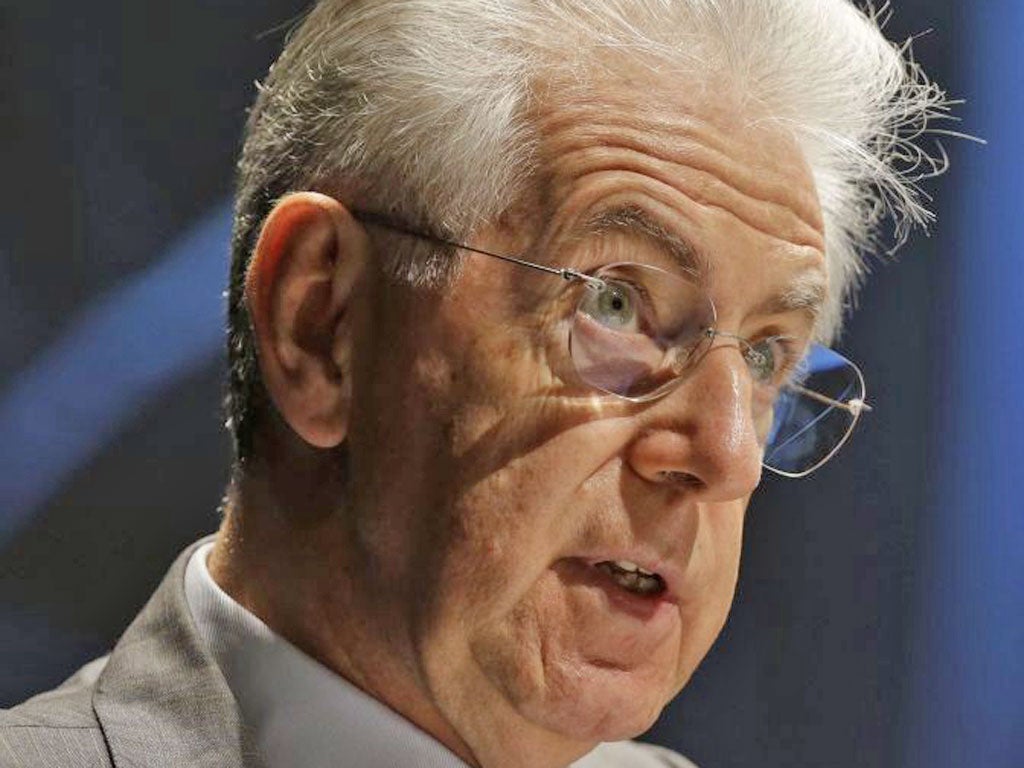Anyone but Silvio Berlusconi: Italy begs unelected Mario Monti to stay
Spectre of former PM is boosting popularity of leader parachuted in by European Union

Your support helps us to tell the story
From reproductive rights to climate change to Big Tech, The Independent is on the ground when the story is developing. Whether it's investigating the financials of Elon Musk's pro-Trump PAC or producing our latest documentary, 'The A Word', which shines a light on the American women fighting for reproductive rights, we know how important it is to parse out the facts from the messaging.
At such a critical moment in US history, we need reporters on the ground. Your donation allows us to keep sending journalists to speak to both sides of the story.
The Independent is trusted by Americans across the entire political spectrum. And unlike many other quality news outlets, we choose not to lock Americans out of our reporting and analysis with paywalls. We believe quality journalism should be available to everyone, paid for by those who can afford it.
Your support makes all the difference.Two political leaders have joined calls for Italy's unelected technocrat Prime Minister, Mario Monti, to stay on in some form after next spring's general election to prevent speculators dragging the Italian economy – and the euro – back to the edge of the abyss.
The realisation that Mr Monti's stabilising stop-gap government has just six months left has been causing alarm bordering on panic among business leaders and even some of the politicians who stand to replace him. His unelected regime was rushed into place in November 2011 with Italy's finances on the precipice – a crisis that forced the resignation of Silvio Berlusconi as Prime Minister.
Since then a range of austerity measures, tax rises and structural reforms have improved Italy's economic outlook and calmed the markets. But a series of on-the-hoof remarks from Mr Berlusconi calling into question the desirability of euro-membership have also reminded Italy what might lie in wait if or when Mr Monti departs. Although Mr Berlusconi has not yet officially declared that he will stand, he is widely believed to still harbour political ambitions.
In the past few days captains of industry have reacted with undisguised delight to comments from Mr Monti that he would be willing to stay on as premier if no clear political winner emerged from the ballot box. The chief executive of Fiat cars, Sergio Marchionne, said that a second Monti government "would be a step forward for the country. It would give credibility and eliminate much uncertainty".
The employers' organisation Confindustria said that if he had the support of a hung parliament there was no reason why Mr Monti should not continue in government. "With the legitimacy of the vote, it would be perfectly fine for me," Giorgio Squinzi, the Confindustria chief, told Ansa news agency when asked about a second Monti-led government.
On Sunday, the leaders of two small political parties – Gianfranco Fini, who split with Mr Berlusconi in 2010 to head his own small party, and Pier Ferdinando Casini, leader of a small centrist party – said they would also support Mr Monti remaining at the helm. "It's looking increasingly likely that somehow or other Monti will stay on," said Professor James Watson, a political pundit at the American University in Rome. He speculated that Mr Monti could even become the powerful Finance Minister in a coalition headed by the Democratic Party – which appears likely to emerge as the single biggest grouping in the lower house after the election.
Mr Monti sought to calm speculation while visiting the International Co-operation Forum in Milan yesterday, saying he hoped "to leave the government of the country to other people".
But another pundit, Sergio Fabbrini, director of the Luiss School of Government in Rome, said that Mr Monti's Economic Development Minister, Corrado Passera, might be given the pivotal economics portfolio in a coalition government after the next election, while Mr Monti became the President. He said that the role of head of state had expanded in recent years to become that of unofficial advocate of EU-Italian affairs. And he added that a Passera-Monti combination would send a "powerful signal" to the markets. Professor Fabbrini told The Independent: "I would bet that in six months' time we will see Mario Monti continue in his role as part of the ruling elite of this country, whether it's as President of the Republic or Prime Minister."
Not everyone, however, welcomed the prospect of Mr Monti extending his time in government. Susanna Camusso, leader of the big left-wing CGIL union that has clashed with the Monti government over labour reform, said a second Monti term "would be a message of resignation, not a prospect for change".
But the mainstream political parties remain in a fractious state of disarray, and so far have had little choice but to support the Monti regime.
This bizarre state of affairs was underlined at the weekend when the centre-left Democratic Party, which stands to win the next election under Italy's flawed proportional representation system, signalled its continuing support for Mr Monti, an unelected, free-market economics professor.
Join our commenting forum
Join thought-provoking conversations, follow other Independent readers and see their replies
Comments